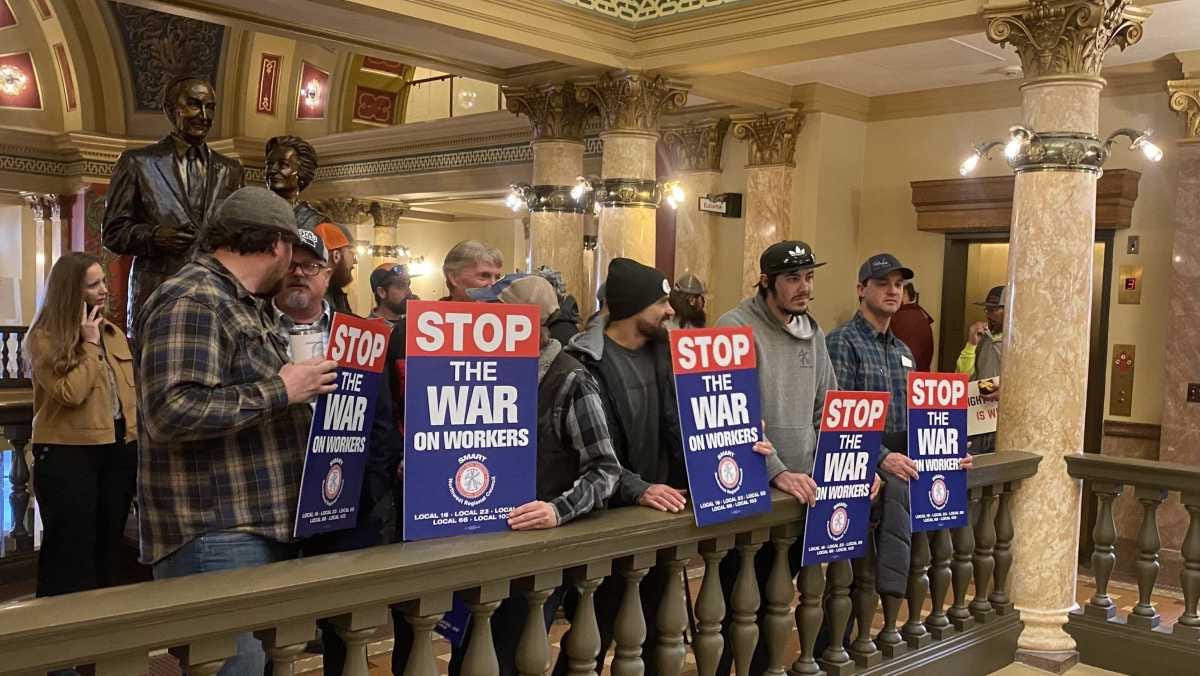Right-To-Work Legislation Voted Down Twice in One Day
Republicans blocked a blast motion on the Senate floor hours after the legislation was tabled in committee
By Zeke Lloyd for Montana Free Press

A bill that would have enacted right-to-work provisions across Montana died twice Saturday at the hands of moderate Republicans who crossed the aisle to join Democrats in opposition.
Senate Bill 376 was first voted down in committee when three GOP senators, Jason Ellsworth, R–Hamilton; Gregg Hunter, R–Glasgow; and Denley Loge, R–St Regis, voted against the legislation alongside the committee’s Democratic lawmakers. Hours later, bill sponsor Senator Mark Noland, R–Bigfork, made a motion on the Senate floor to blast the bill out of committee.
“I think it would be a great opportunity that we get to stand on this floor and actually have a good debate on this particular bill,” Noland said in his introduction to the motion, which needed a simple majority vote to bring the bill before the chamber to debate.
But he was not successful.
“We have heard, overwhelmingly, over and over again, that the people of Montana do not want this,” countered Senator Cora Neumann, D–Bozeman, on the Senate floor.
Fourteen majority Republicans voted alongside 18 Democrats to stamp out the blast motion.
Right-to-work policies like SB 376 block employers from mandating union membership or requiring employees to pay union dues or fees as a condition of employment.
On February 28, labor advocates flanked the path from the Capitol’s rotunda to the Senate Business, Labor, and Economic Affairs Committee hearing a floor above at the end of the building’s east wing. That’s where Noland’s bill was to be heard by lawmakers.
Seeing the long line of people holding signs opposing his legislation, committee Chair Noland set a limit on speaking time for proponents and opponents of his bill, giving supporters 45 minutes and opponents an hour, plus any time not used by supporters. Limits on testimony are common when hearings are packed.
“We’re going to give you a little more time, because there’s more of you. And you know, I’m all about fairness,” Noland said with a chuckle.
Ultimately, time ran out before every opponent could offer their full testimony; more than 200 people signed the list to speak against the bill.
Only two proponents, National Right-to-Work Committee Vice President John Kalb and Montana Citizens for Right-to-Work Executive Director Randy Pope, spoke in favor of the bill.
“This bill would guarantee workers the right to decide for themselves whether or not a labor union deserves their financial support, the same as any other private organization,” Pope said during his testimony. “It is our belief that every worker who wants to join a union should have that right. And every worker that does not want union representation should not be forced to pay for it.”
Doug Meyer, a member of Sheet Metal Workers Local 103, drove from his home in Idaho Falls to protest the right-to-work policy in the halls of the Montana Capitol.
“Right-to-work does not work for blue collar and average, everyday workers,” Meyer said in an interview with Montana Free Press. “I believe it suppresses wages and I believe that those profits go back to the company and not to the workers that are actually building and doing the important work that needs to be done.”
A dozen nurses with the Montana Nurses Association arrived in matching cobalt shirts that read “Nurses want what patients need.” According to Chief Executive Officer Vicky Byrd, MNA is a professional association, not a union, but about 90% of its members are unionized.
“We’re in 30 local units across the state — public and private hospitals or facilities where nurses have chosen to form a union to advocate for better working conditions, for better quality care for their patients and better wage benefits,” Byrd said.
In 2023, a similar right-to-work bill died in committee. In 2021, right-to-work legislation passed out of committee before dying on the House floor. Last week, two pieces of legislation aimed at weakening organized labor went down.
Throughout his bill’s life, and even after its death, Noland maintained a jovial demeanor and positive outlook. As a seemingly endless line of opponents disparaged his proposed legislation, he listened attentively and took notes from the seat directly beside the podium. Noland said he valued watching public testimony inform the democratic process.
“It’s a great opportunity to live in America. Many countries do not have what we have,” Noland said as he introduced the bill. “When we hear today’s proponents and opponents, we get to decide what is right for the citizens of Montana.”
As he closed on his bill, Noland shed light on why he chose to endure the contentious hearing over a bill that faced a difficult path to becoming law. He shared an anecdote about his father, Jack Noland, who passed away in 2019. He retired from a job that mandated him to be part of a union for more than 40 years.
“He had to picket. He had to pay dues. He hated every minute of that part of it,” Noland said. “When he retired, he said, ‘I’m free. Son, really think about if you’re going to go to work for a union.’”
After the defeat of SB 376, it will be another two years until conservative Republicans can try to add Montana to the list of 27 states with right-to-work laws.





"Right-To-Work" means the right to not pay a living wage and the right to fire someone for no good reason.